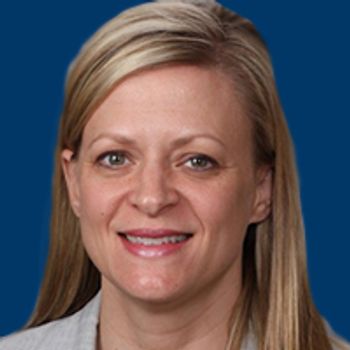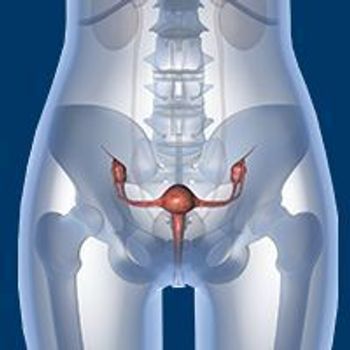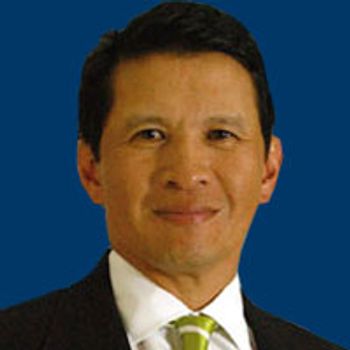
Up to 40% of patients with diffuse large B-cell lymphoma are refractory to or relapse after first-line treatment.

Your AI-Trained Oncology Knowledge Connection!


Up to 40% of patients with diffuse large B-cell lymphoma are refractory to or relapse after first-line treatment.

Prostate cancer is a highly hetero-geneous disease, with individual tumor cells having distinct genomic and pheno-typic characteristics, resulting in a great deal of variability in patients’ disease course.

Actionable mutations identified in colorectal cancer have contributed significantly to the expansion of the therapeutic options available for patients with metastatic disease.

The majority of patients with indolent follicular lymphoma do well with observation and after first-line treatment, but approximately 20% experience disease progression within 2 years of their initial treatment, which is associated with a 50% risk of dying within 5 years. Subsequently, this is an area of unmet need but one in which considerable progress is being made.

The highly heterogeneous nature of cholangiocarcinoma at the genomic, epigenetic, and molecular levels has led to the development of effective new treatments for patients with these rare malignant tumors.

After years of stagnation, the paradigm for treating patients with unresectable intermediate-stage or advanced hepatocellular carcinoma is starting to change as a result of novel strategies and evolving views of appropriate patient populations for systemic therapies.

Although rates of hepatocellular carcinoma incidence started to plateau in 2013, many cases continue to be diagnosed at more advanced stages, especially in patients without liver disease.

Targeted therapy approaches have expanded rapidly in ovarian cancer over the past 3 years, with the FDA approving 4 new strategies in frontline settings that allow women to remain free of disease progression longer than the previous standard of care.

Kidney cancer experts emphasize the importance of risk stratification for guiding treatment decisions and discussed the clinical trials that have shaped the frontline treatment recommendations from the National Comprehensive Cancer Network for advanced clear cell RCC.

During an OncLive Peer Exchange® program on individualizing treatment and improving outcomes for patients with CRC, a panel of experts shared their insights on early-onset CRC, which has been observed to occur as early as adolescence.

A panel of experts discusses the role of BRCA1/2 mutation testing and how and when to incorporate PARP inhibitors into the care of patients with BRCA-positive TNBC.

A panel of experts discusses the current state of CAR T-cell therapies and sheds light on the future directions of this therapeutic approach.

During the past decade, the treatment of multiple myeloma has significantly changed, enabling more patients to achieve deep and durable responses.

Research into the biology of prostate cancer has resulted in a growing understanding of the molecular drivers of the malignancy, resulting in a rapid evolution of genetic testing that is poised to revolutionize the diagnosis and care of at-risk men as well as those who have the disease.

Despite significant developments on the advanced melanoma treatment front, “many clinical scenarios remain where there is no clear-cut course of action," said Robert H.I. Andtbacka, MD, CM, during a recent OncLive Peer Exchange®.

In 1941, Charles Brenton Huggins, MD, observed that prostate cancer could be controlled by hormone-directed treatments, a discovery for which he was awarded half the Nobel Prize in Physiology or Medicine in 1966.

Patients with advanced lymphoid malignancies have had few treatment options, particularly those with extensive, refractory disease. Allogeneic or autologous hematopoietic stem cell transplantation has been one life-prolonging and potentially curative option for these patients, but these procedures are associated with various toxicities and are not appropriate for all patients, with older adults and those with great- er disease burden often excluded as candidates.

Although lung cancer remains the leading cause of cancer-related mortality in the United States and 5-year survival rates are low at 17.8%, the grim picture for this tumor type is starting to shift to a more hopeful one as its biology is becoming better understood, facilitating treatment selection and providing researchers with new therapeutic targets.

Molecular testing for colorectal cancer continues to evolve at a rapid pace. Biomarkers already have the potential to predict outcomes and better target therapies, with the eventual goal to completely personalize treatments based on the patient’s individual biomarker profile and other tumor markers.

The National Comprehensive Cancer Network (NCCN) recently held its 15th Annual Conference in Hollywood, Florida. The conference was entitled �Clinical Practice Guidelines & Quality Cancer Care� and included multiple presentations with updates to the NCCN Guidelines. We cover updates to the NCCN Guidelines for breast cancer, acute myeloid leukemia, and multiple myeloma.

According to a large study conducted at the University of Texas MD Anderson Cancer Center and presented at the AACR 101st Annual Meeting 2010, eating well-done meat, especially red meat, may increase the risk of bladder cancer, particularly in individuals with genetic variants in their metabolism.

According to a pre-clinical study presented at the AACR 101st Annual Meeting 2010, a regimen of nab-paclitaxel (Abraxane) given in combination with bevacizumab (Avastin) may have potential in treating triple-negative breast cancer, one of the most aggressive, therapy- resistant, and highly metastatic subtypes of breast cancer.

Although KRAS gene mutation is a well-established biomarker for a lack of response to anti-epidermal growth factor receptor (anti-EGFR) antibodies in colorectal cancer, a study presented at the AACR 101st Annual Meeting 2010 sought to determine whether mutations in 9 genes known to be mutated in colorectal cancer, including AKT1, BRAF, CTNNB1, EGFR, KRAS (exon 3), NRAS, PIK3CA, PTEN, and TP53, could also predict response to Vectibix (panitumumab) in patients with metastatic colorectal cancer.

Susan G. Komen for the Cure's partnership with KFC to raise funds and spread breast cancer awareness and educational messaging by selling chicken in specially designed pink buckets has generated considerable controversy, with some wondering what message this partnership is sending.

Published: May 12th 2022 | Updated:

Published: May 6th 2021 | Updated:

Published: June 24th 2021 | Updated:

Published: June 15th 2021 | Updated:

Published: June 3rd 2010 | Updated:

Published: September 2nd 2016 | Updated: